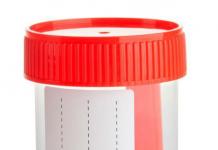The article describes medical drug Captopril, instructions for its use, release forms, pharmacological properties of the drug, indications for use, composition, possible side effect on the human body and other aspects of this drug.
Drug drug Captopril– a universal drug that lowers blood pressure. It is used to urgently reduce blood pressure, to prevent diabetes and oncology.
Because the drug is dispensed in pharmacies only with a doctor’s prescription - only the doctor determines the dosage for the patient. Self-medication is strictly prohibited.
Captopril belongs to the group ACE inhibitors. Its action is to narrow the lumen of blood vessels and increase the release of aldosterone in the adrenal cortex. Long-term use of the drug reduces myocardial hypertrophy and the amount of sodium in the body, which is good for people with chronic heart disease.
 Begins to act within 15 minutes (put under the tongue), which contributes to the ability to stop the hypertensive crisis and complications high blood pressure. With normal oral administration, active substance absorbed into the stomach and takes effect within an hour. Do not take the medicine with meals, because the process of exposure to the drug slows down.
Begins to act within 15 minutes (put under the tongue), which contributes to the ability to stop the hypertensive crisis and complications high blood pressure. With normal oral administration, active substance absorbed into the stomach and takes effect within an hour. Do not take the medicine with meals, because the process of exposure to the drug slows down.
Composition and release form of the drug Captopril
The medicinal product consists of the active substance of the same name – captopril, which is part of the group ACE inhibitors. Excipients to improve medication intake: lactose, starch (dry), castor oil, etc.
The drug is available exclusively in the form of tablets in blisters of 10 pieces of different dosages - 12.5 mg, 25 mg, 50 mg. The box can contain 2 or 4 blisters.
pharmachologic effect

The drug, an angiotensin-converting enzyme inhibitor (ACEI), makes it difficult to change inactive angiotensin I to angiotensin II, which tends to narrow the lumens of the body’s blood vessels. Taking the drug reduces the content of angiotensin II in the body and thereby reduces blood pressure. Reduces the resistance of blood vessels to the force of blood flow.
Video
After oral administration, more than 75% of the substance is absorbed into the gastrointestinal tract. Eating reduces the active absorption of the drug by 40%.
What doctors say about hypertension
Doctor medical sciences, Professor Emelyanov G.V.:

I have been treating hypertension for many years. According to statistics, in 89% of cases, hypertension results in a heart attack or stroke and death. Currently, approximately two thirds of patients die within the first 5 years of disease progression.
The next fact is that it is possible and necessary to reduce blood pressure, but this does not cure the disease itself. The only medicine that is officially recommended by the Ministry of Health for the treatment of hypertension and is also used by cardiologists in their work is. The drug acts on the cause of the disease, making it possible to completely get rid of hypertension. In addition, within the framework of the federal program, every resident of the Russian Federation can receive it FOR FREE.
Indications for use
First of all, the drug Captopril is prescribed to reduce blood pressure, prevent the onset of a hypertensive crisis, in cases chronic diseases hearts.
The indication for prescribing the drug may be a systolic pressure of 140 mmHg. in people who, at such indicators, feel symptoms of a hypertensive crisis.
It is worth remembering that a hypertensive crisis (a sharp rise in pressure to 160 per 100 mm Hg or higher) requires immediate medical attention.
Captopril is also used in cases of:
- Acute renal failure.
- Increased blood pressure for no specific reason.
- Type 1 diabetes mellitus.
- Post-mortem myocardial infarction.
- Disorders of the ventricles of the heart.
Important! An agronomist from Barnaul with 8 years of experience in hypertension found old recipe, set up production and released a product that will once and for all relieve you of blood pressure problems...
Methods of application
Depending on the indication for which the medicine is prescribed, the doctor determines the dosage. Self-administration of the drug is prohibited. Captopril is taken an hour before meals for best effect.
To localize a hypertensive crisis, Captopril is taken one tablet under the tongue every 20 minutes. Maximum dose– 3 tablets. This helps to quickly lower blood pressure and improve the patient’s well-being. In cases of heart pain, nitroglycerin is added to Captopril, the dose of Captopril is reduced to 2 tablets to prevent a decrease in blood pressure.
When hypertension the drug is prescribed in a volume of 25 mg 2 times a day. To achieve the desired effect, the dosage of the drug is increased in stages every 2-4 weeks. Depending on the severity of hypertension, the following is prescribed:
- Soft or average degree – 2 tablets of 12.5 mg 2 times a day. Daily max. dose – 100 mg.
- Severe degree– 50 mg 3 times a day. Daily dose – 150 mg.
When treating heart diseases, 6.25 mg is prescribed 2-3 times a day, gradually increasing the dose (not earlier than after 2 weeks). The average dosage is 25 mg 2-3 times a day. The dose is also gradually increased. Maximum possible daily norm is 150 mg of active substance. Therapy for myocardial infarction: take 3 tablets 3 times a day, the dose is gradually reduced. During the acute course of the disease, taking the drug is contraindicated to avoid worsening the patient's condition.
For older people, the dosage of Captopril is selected individually, but not more than 6.25 mg 2 times a day.
The medicine can be used to quickly lower blood pressure. If the pressure readings reach 145 to 105 or higher, you need to take 1 tablet. Repeated administration of another tablet after 40 minutes is acceptable if the pressure has not decreased during this time.
The drug Captopril is taken as a preventive measure for high blood pressure.
The dosage of the drug is determined exclusively by a specialist. Self-medication can lead to headaches, nausea, lethargy, and drowsiness.
If side effects occur after taking the minimum dose of the medicine, you should stop taking it immediately.
Contraindications
- Narrowing of the lumen of blood vessels.
- Myocardopathy.
- Swelling of the skin, face, limbs.
- Primary hyperaldosteronism (Conn's syndrome).
- Pregnancy and lactation period.
- Children under 18 years of age.
- When driving vehicles, and mechanisms that require concentration.
- Individual intolerance to individual components of the drug.
- Arterial hypotension.
- The period after kidney transplantation.
Pregnancy. The use of the drug is contraindicated. If the course of treatment is started earlier than the expected start of pregnancy, then during the period of pregnancy it is necessary to replace Captopril with another drug that is safer for the health of the mother and child.
Lactation period. Taking the drug during breastfeeding contraindicated. The active substance is excreted into breast milk and can affect the hemodynamics of the child. During treatment with the drug, the child should be transferred to artificial feeding.
Children. Taking the drug for children under 18 years of age is not advisable. In case of emergency, the doctor determines the dosage, which differs from the standard one.
Depending on the child’s body weight, it is prescribed daily dose 1-1.5 mg per 1 kilogram of weight.
Side effects
This medicine has a large list of side effects, which appear throughout the course of treatment with the drug. Doctors recommend that the first days of treatment be carried out under the constant supervision of specialists in order to monitor the body’s reaction to the active substance.
Surgical intervention in the human body while taking the medicine is prohibited. Anesthesia has a negative effect on blood pressure and can sharply lower it.
The appearance of jaundice also requires immediate refusal to take Captopril.
Alcoholic drinks are not compatible with treatment with Captopril.

Captopril affects the results of urine tests for acetone. This analysis It is better to take it some time after the end of the course of treatment.
You should consult a doctor if you experience infectious diseases, colds, with significant loss of fluid from the body (vomiting, nausea, diarrhea).
In rare cases, the drug may increase potassium levels in the blood of a person who is sick diabetes mellitus or renal failure.
Captopril has the following side effects:
- Tachycardia.
- Head pain, dizziness.
- Drowsiness, lethargy, loss of performance.
- Bronchospasm, pulmonary edema.
- Deterioration of vision.
- Rash, itching and other redness of the skin.
- Dry mouth.
- Attacks of dry cough.
- Loss of appetite.
- Changes in taste sensations.
- Abdominal pain, diarrhea.
The manifestation of at least one of the above symptoms requires immediate discontinuation of the drug and contacting your doctor to replace the drug with another.
Overdose with Captopril
An overdose of Captopril provokes downward jumps in blood pressure and thromboembolic complications. It is necessary to put the person in a horizontal position and the symptoms will go away in a couple of hours.
special instructions
Before starting a course of treatment, the body's water balance should be in normal level. Throughout treatment, it is necessary to monitor kidney function. Sometimes it is possible to release protein into the urine, which will go away within a month without additional measures. The level of protein in the urine should not exceed 1000 mg per day, otherwise another drug is selected for treatment.
Treatment is carried out under close medical supervision in the following cases:
- Inflamed or dilated blood vessels.
- Diffuse disorders in connective tissues.
- Taking immunosuppressants.
- Kidney disorders.
Also, before starting treatment, the patient undergoes general analysis blood, and every two weeks for 3 months of treatment, as well as after the end of treatment. If the level of leukocytes in the blood decreases to 1 g per liter of blood or less, then the drug is replaced with another.
In order to avoid a sharp decrease in blood pressure, the patient is stopped taking all diuretics. If symptoms appear arterial hypotension the person needs to take a horizontal position and slightly raise his legs.
Caution must be exercised when treating with drugs that interfere with the synthesis of uric acid or have a membrane-stabilizing effect.
In patients with kidney disease, taking Captopril increases the chance of developing proteinuria.
Taking Captopril during hemodialysis requires not using membranes with high conductivity to avoid pseudo-allergic reactions.
In cases of swelling of the subcutaneous tissue, skin or mucous membranes, it is necessary to discontinue the drug and examine the patient. If your face is swollen, you should take antihistamines. In case of swelling of the throat, adrenaline is immediately administered intravenously.
Interaction with other drugs
The combined use of diuretics and vasodilators enhances the hypotensive effect of Captopril.
Nonsteroidal anti-inflammatory drugs, estrogens and clonidine reduce the hypotensive effect of Captopril.
An increase in potassium concentration occurs when Captopril is taken simultaneously with diuretics that conserve potassium.
Taking immunosuppressants together with Captopril increases the chance of hematological dysfunction.

Taking insulin and hypoglycemic drugs has a potential risk of glycemia during treatment with Captopril.
Analogues of the drug Captopril
Depending on the manufacturer, there are analogues of Captopril:
- Captopril Hexal.
- Captopril Sandoz.
- Captopril AKOS.
- Captopril Alkaloid.
- Captopril Credopharm.
- Captopril STI.
- Captopril UBF.
- Captopril Ferein.
- Captopril Norton.
- Captopril Egis.
In accordance with the active substance, analogues are distinguished:
- Kapoten.
- Kaptopres.
- Alkadil.
- Blockordil.
- Vero Captopril.
Kaptopres
Blockordil
All drugs have their own area of effect. Only a doctor can select the necessary medicine and its dosage depending on the patient’s health condition, his age, and the presence of other diseases.
Price
The average cost of Captopril in pharmacies is 20 rubles. for 20pcs per package. Dispensed only with a doctor's prescription.
Captopril, Captopril-Norton is produced in the form of tablets containing the active ingredients of Captopril 25 mg or 50 mg,
About the drug
Captopril is an ACE inhibitor. It has a hypotensive (reduces pressure), vasodilator, cardioprotective, natriuretic effect. Prevents the transition of angiotensin I to angiotensin II and prevents the inactivation of endogenous vasodilators.
With long-term use, Captopril reduces the severity of left ventricular myocardial hypertrophy, prevents the progression of heart failure and slows down the development of left ventricular dilatation.
It has a cardioprotective effect (protects the heart) - it dilates arteries to a greater extent than veins. Improves blood supply to ischemic myocardium and reduces platelet aggregation. Captopril helps reduce sodium levels in patients with CHF.
The maximum content of the active substance in the blood plasma is achieved after 30-90 minutes. Due to its vasodilating and hypotensive effects, the use of captopril for blood pressure has become widespread. But not everyone knows in which cases it is appropriate to use the drug without harm to health.
Should I use captopril at what blood pressure? The instructions for use say that the drug has a hypotensive effect - this means Captopril tablets are taken for high blood pressure.
What does captopril help with?
The drug is used for the following pathologies and conditions:
- Arterial hypertension, incl. renovascular (mild or moderate - as the first-line drug of choice; severe - with ineffectiveness or poor tolerability of standard treatment).
- Heart failure (in complex therapy). Captopril is prescribed for the treatment of CHF with decreased ventricular systolic function, as well as in combination with other drugs.
- LV dysfunction after myocardial infarction in a clinically stable condition.
- Essential hypertension (persistent rise blood pressure unknown reason).
- Prevention of renal failure in patients with diabetic nephropathy or other kidney diseases (with or without hypertension).
Instructions for use Captopril, dosage
How to take captopril? The main way to take captopril is orally 1 hour before meals. The dosage regimen is set individually.
For essential hypertension (high blood pressure), start taking captopril tablets with the lowest effective dose of 12.5 mg 2 times a day (rarely with 6.25 mg 2 times a day). You should pay attention to the tolerability of the drug during the first hour.
For the treatment of chronic heart failure (CHF), captopril is prescribed if the use of diuretics does not provide a therapeutic effect. The initial dosage is 6.25 mg or 12.5 mg 3 times a day, if necessary, the dose is increased to 25 mg 3 times a day. In the future, additional corrections are possible at intervals of at least 2 weeks in the direction of increasing the dose.
The maximum daily dosage of Captopril is 150 mg.
For diabetic nephropathy (insulin-dependent diabetes mellitus), the initial daily dose is 6.25 mg. The increase should be carried out gradually to the recommended daily dose of 75 mg - 100 mg in three divided doses. With a total protein clearance of more than 500 mg per day, the drug is effective at a dose of 25 mg 3 times a day.
In case of renal impairment, doses are set taking into account creatinine clearance. The maximum daily dose should not exceed 75-100 mg.
In old age, the dose of Captopril is selected individually; it is recommended to start therapy with a dose of 6.25 mg 2 times a day and, if possible, maintain it at this level.
Currently, due to the short time of action, the drug is used only to relieve crises by resorption - 25-50 mg of captopril under the tongue.
special instructions
The use of Captopril should be carried out under regular medical supervision. During therapy, monitoring of blood pressure, peripheral blood patterns, protein levels, plasma potassium, urea nitrogen, creatinine, and renal function is necessary.
It is recommended to avoid the consumption of alcoholic beverages during captopril therapy. Use the drug with caution when driving vehicles and people whose professions involve high concentration of attention.
Contraindications Captopril
Hypersensitivity to captopril or other ACE inhibitors, pregnancy, lactation (in Russia the drug is not approved for use in persons under 18 years of age).
The drug is prohibited in the following cases:
- development of Quincke's edema;
- severe kidney and liver dysfunction;
- cardiogenic shock;
- tendency to arterial hypotension;
- the presence of severe heart defects.
Concomitant use of bone marrow depressants and captopril increases the patient's risk of developing potentially fatal neutropenia and agranulocytosis.
Side effects of Captopril
- Dizziness, headache, feeling of fatigue, asthenia, paresthesia.
- Severe hypotension, tachycardia, peripheral edema; rarely – tachycardia.
- Nausea, loss of appetite, dry mouth, changes in taste, nausea, abdominal pain, rarely - hepatitis and jaundice.
- Rarely – neutropenia, anemia, thrombocytopenia; very rarely in patients with autoimmune diseases - agranulocytosis.
- Hyperkalemia, acidosis, hyponatremia.
- Proteinuria, impaired renal function (increased concentrations of urea and creatinine in the blood).
- Dry cough.
- Skin rash; rarely - Quincke's edema, bronchospasm, serum sickness, lymphadenopathy; in some cases - the appearance of antinuclear antibodies in the blood.
Analogues of Captopril, list
Analogues of Captopril and other drug names (trade marks), list of drugs:
- Vero-Captopril
- Kapoten
- Capto
- Captopril
- Captopril Hexal
- Captopril-Acos
- Captopril-Acree
- Captopril-Biosynthesis
- Captopril-MIC
- Captopril-N.S.
- Captopril-STI
- Captopril-Ferein
- Captopril-FPO
- Captopril-Egis
Please note that the instructions for use of captopril, price and reviews do not apply to analogues. When changing the drug, consult your doctor. There may be a need for dosage adjustment or other side effects or contraindications. This is due to different concentrations of the active substance and excipients.
FAQ
Capoten or Captopril, which is better? These are drugs with the same active ingredients. Capoten contains 25 mg. active ingredient captopril. In fact, they are just different brands.
Can I take captopril if I have high blood pressure? Yes, captopril is used for high and elevated blood pressure and hypertension. See instructions for use and dosage above.
At what blood pressure should I take captopril? With increased The doctor should prescribe specific numbers and dosage, taking into account age, possible diseases and other factors. Self-medication is unacceptable. The heart is not a toy!
Captopril and alcohol - you should refrain from drinking alcohol while taking the drug tablets. If you have heart problems, it is better to abstain altogether.
How to take captopril under the tongue - take 1 tablet 25-50 mg. This method of taking the drug is common during crises. The usual use is internally.
Captopril: instructions for use and reviews
Captopril is an angiotensin-converting enzyme (ACE) inhibitor.
Release form and composition
Dosage form – tablets (10 pieces in a blister pack, 1, 2, 3, 4, 5 or 10 packs in a cardboard box).
The active substance is captopril, 25 or 50 mg in 1 tablet.
Pharmacological properties
Pharmacodynamics
Captopril is an angiotensin-converting enzyme (ACE) inhibitor that inhibits the conversion of angiotensin I to angiotensin II, thereby reducing the release of aldosterone. This effect leads to a decrease in total peripheral vascular resistance, blood pressure (BP), post- and preload on the heart.
Plasma renin activity does not affect the hypotensive effect. A decrease in blood pressure occurs with both normal and decreased levels of the hormone, which is explained by the effect on the tissue renin-angiotensin system.
Long-term use of captopril leads to a decrease in the severity of myocardial hypertrophy, as well as the walls of resistive arteries.
The drug also has the following effects on the body:
- increases renal and coronary blood flow;
- reduces platelet aggregation;
- increases blood supply to ischemic myocardium;
- helps reduce the concentration of sodium ions in patients with heart failure;
- reduces the degradation of bradykinin and increases the synthesis of prostaglandin.
Captopril dilates arteries more than veins.
Unlike the use of direct vasodilators (minoxidil, hydrazine, etc.), a decrease in blood pressure after taking captopril does not cause manifestations of reflex tachycardia and leads to a decrease in the myocardial need for oxygen. In heart failure, an adequate dose of the drug does not affect blood pressure.
After oral administration, the maximum decrease in blood pressure is observed after 1–1.5 hours. The duration of the hypotensive effect is dose-dependent and reaches its optimal value over several weeks.
Pharmacokinetics
Absorption of the drug is rapid and amounts to 75% (in the case of food intake, this figure decreases to 35–45%), bioavailability is 35–40% (as a result of the first pass effect through the liver). The drug penetrates poorly through the placental and blood-brain barriers (up to 1%). Approximately 25–30% of the administered dose is bound to plasma proteins (mostly albumin). When taken orally, the maximum plasma level is 114 ng/ml and is achieved after 0.5–1.5 hours.
Metabolized in the liver, resulting in the formation of captopril disulfide dimer and captopril-cysteine disulfide. Metabolites are pharmacologically inactive.
About 95% of the dose is excreted by the kidneys (40–50% unchanged), the rest in the form of metabolites. The half-life is 3 hours. Secreted into breast milk. 4 hours after a single oral dose, 38% of unchanged captopril remains in the urine, 28% of its metabolites. After 6 hours, only metabolites remain in the urine. Unchanged captopril (38%) and its metabolites (62%) were detected in 24-hour urine.
In chronic renal failure, Captopril accumulates. In patients with impaired renal function, the half-life is 3.5–32 hours.
Indications for use
Contraindications
- Angioedema (including a history after taking other ACE inhibitors) or hereditary;
- Cardiogenic shock;
- Arterial hypotension;
- Mitral stenosis, aortic stenosis, other disorders of blood outflow from the left ventricle of the heart;
- Severe renal dysfunction, hyperkalemia, azotemia, stenosis of a single kidney with progressive azotemia, bilateral renal artery stenosis, primary hyperaldosteronism, condition after kidney transplantation;
- Severe liver dysfunction;
- Age up to 18 years;
- Pregnancy and breastfeeding period;
- Hypersensitivity to captopril and other ACE inhibitors.
The drug should be prescribed with caution to patients with severe autoimmune diseases (including scleroderma, systemic lupus erythematosus); with cerebral ischemia, coronary disease heart disease, inhibition of bone marrow circulation (risk of developing agranulocytosis and neutropenia), diabetes mellitus (high likelihood of developing hyperkalemia), conditions accompanied by a decrease in circulating blood volume, including vomiting and diarrhea; patients on a sodium-restricted diet, those on hemodialysis, as well as elderly patients.
Instructions for use of Captopril: method and dosage
Captopril tablets are taken orally 1 hour before meals.
The doctor prescribes the daily dose individually based on clinical indications.
Recommended dosage regimen for chronic heart failure (with combination therapy), in the absence of adequate effect from the use of diuretics: initial dose of 6.25 mg 2-3 times a day. The dose is adjusted to the average maintenance dose - 25 mg 2-3 times a day gradually, with an interval of 2 or more weeks. If it is necessary to further increase the dose, increase it once every 2 weeks;
Recommended dosage regimen of Captopril for blood pressure arterial hypertension: initial dose of 25 mg 2 times a day. If the therapeutic effect is insufficient, it is recommended to increase the dose gradually, once every 2-4 weeks. Maintenance dose for moderate forms of arterial hypertension – 25 mg 2 times a day, but not more than 50 mg; for severe forms – 50 mg 3 times a day.
The maximum daily dose is 150 mg.
The daily dosage of the drug for patients with impaired renal function is recommended to be prescribed: for moderate degrees (creatinine clearance (CR) not lower than 30 ml/min/1.73 m2) - 75-100 mg, for severe impairment (CR below 30 ml/min /1.73 m2) – initial dose 12.5-25 mg per day. If necessary, the increase is carried out over a long period of time, but the drug is always used in a daily dose less than usual.
For elderly patients, the dose is selected strictly individually; it is recommended to start treatment with 6.25 mg 2 times a day and try to maintain the dose at this level.
If additional diuretics are necessary, a loop diuretic rather than a thiazide diuretic is prescribed.
Side effects
The use of Captopril may cause side effects:
- From the outside of cardio-vascular system: significant decrease in blood pressure, orthostatic hypotension, peripheral edema, tachycardia;
- From the outside gastrointestinal tract, pancreas, liver: dry mouth, impaired taste, decreased appetite, nausea, stomatitis; rarely – abdominal pain, diarrhea, hyperbilirubinemia, increased activity of liver enzymes, hepatitis;
- From the urinary system: impaired renal function (increased levels of creatinine and urea concentrations in the blood), proteinuria;
- From the outside nervous system: drowsiness, dizziness, feeling of fatigue, headache, paresthesia, ataxia, asthenia, blurred vision;
- From the hematopoietic system: rarely - anemia, neutropenia, agranulocytosis, thrombocytopenia;
- From the respiratory system: bronchospasm, dry cough (transient), pulmonary edema;
- Laboratory indicators: hyponatremia, hyperkalemia, acidosis, in patients with diabetes mellitus – hypoglycemia (with the use of oral hypoglycemic agents and insulin);
- Dermatological reactions: increased photosensitivity, itching, skin rash, usually maculopapular, less often – bullous or vesicular;
- Allergic and immunopathological reactions: angioedema of the mucous membranes of the mouth, tongue, larynx and pharynx, lips, face and limbs, very rarely - intestinal edema; lymphadenopathy, serum sickness, in rare cases - the presence of antinuclear antibodies in the blood;
- Other: paresthesia.
Overdose
Symptoms of overdose: a sharp decrease in blood pressure.
special instructions
When prescribed and regularly while taking the drug, it is necessary to monitor kidney function.
Treatment of patients with chronic heart failure should be carried out under close medical supervision.
With caution, especially against the background of impaired renal function, Captopril is prescribed in combination with immunosuppressants (including cyclophosphamide, azathioprine), allopurinol or procainamide, in patients with systemic vasculitis or diffuse connective tissue pathologies. To prevent serious complications, before starting use, during the first 3 months (once every 2 weeks) and periodically throughout the entire period of use of the drug, it is necessary to monitor the peripheral blood picture.
In patients with a history of kidney disease, captopril increases the likelihood of developing proteinuria, therefore, in this category of patients, the level of protein in the urine should be monitored during the first 9 months (once every 4 weeks), and if it exceeds the norm, the issue of discontinuing the drug should be considered .
The risk of developing renal dysfunction exists in patients with renal artery stenosis; if the level of creatinine or urea in the blood increases, it is necessary to reduce the dose of the drug or discontinue it.
To prevent the development of anaphylactoid reactions in patients taking Captopril, it is recommended not to use high-permeability dialysis membranes (including AN69) for hemodialysis.
The risk of developing arterial hypotension from using the drug can be reduced if before the start of treatment (4-7 days) you significantly reduce the dose or stop using diuretics.
If symptomatic arterial hypotension occurs while taking the drug, the patient is advised to take a horizontal position and raise his legs.
In case of severe arterial hypotension, the patient must be administered intravenously isotonic solution sodium chloride.
If angioedema develops, you should discontinue the drug and immediately consult a doctor. For swelling localized to the face, usually no special treatment is required other than taking antihistamines to reduce the severity of symptoms. If there is a threat of developing airway obstruction (swelling of the tongue, pharynx or larynx), 0.5 ml of epinephrine (adrenaline) in a ratio of 1:1000 must be injected subcutaneously.
The use of Captopril may cause dizziness, especially at the beginning of treatment, so patients are advised to refrain from driving vehicles and machinery, and potentially dangerous species activities that require concentration and high speed of psychomotor reactions.
Use during pregnancy and lactation
The drug is contraindicated for use during pregnancy and breastfeeding.
If pregnancy occurs, Captopril should be stopped immediately.
Use in childhood
Captopril tablets are contraindicated for use in patients under 18 years of age.
For impaired renal function
Captopril is contraindicated for use in cases of severe renal impairment.
For liver dysfunction
According to the instructions, Captopril is contraindicated for use in cases of severe liver dysfunction.
Use in old age
When treating elderly patients, the drug should be used with caution (dose adjustment is necessary).
Drug interactions
The hypotensive activity of captopril is potentiated by vasodilators (minoxidil) and diuretics.
The combination with clonidine, estrogens, indomethacin and other non-steroidal anti-inflammatory drugs helps reduce the hypotensive effect of the drug.
At simultaneous use Captopril:
- Potassium-sparing diuretics and potassium supplements may cause hyperkalemia;
- Gold preparations (sodium aurothiomalate) and angiotensin-converting enzyme inhibitors cause a complex of symptoms, including nausea, vomiting, facial flushing, and decreased blood pressure;
- Procainamide and allopurinol increase the risk of Stevens-Johnson syndrome and/or neutropenia;
- Lithium salts increase the lithium content in blood serum;
- Cyclophosphacine, azathioprine and other immunosuppressants increase the likelihood of hematological disorders;
- Insulin and oral hypoglycemic agents increase the risk of hypoglycemia.
Analogues
Analogs of Captopril are: Capoten, Captopril-STI, Captopril-AKOS, Captopril Sandoz, Captopres, Alkadil.
Terms and conditions of storage
Store out of reach of children, in a dry place at temperatures up to 30 °C.
Shelf life – 3 years.
The drug Captopril is a universal blood pressure lowering agent. It is also used to prevent diabetes and cancer.
Manufacturer: Indian pharmaceutical company Shreya House, which has an official representative office in Russia.
- magnesium stearate;
- starch;
- lactose monohydrate;
- talc.
Release form: tablets with a flat cylindrical shape. They have a specific aroma and a white tint.
The amount of active ingredient per tablet is 25 mg.
Pharmacological action, pharmacodynamics
ACE inhibitor. When taking the drug, high blood pressure begins to decrease gradually, due to which the drug is prescribed to many patients.
Quickly absorbed by the stomach. The active effect occurs 2 hours after taking the tablet. Excretion - unchanged in urine. 25-35% binds to blood proteins. The bioavailability of the active ingredient is about 70%.
Captopril is prescribed not only for hypertension, but also for other diseases.
Indications for use
- as an adjuvant in the treatment of hypertension;
- after a heart attack;
- cardiac ischemia;
- for severe heart failure (as an additional treatment);
- with diabetic nephropathy;
- dysfunction of the left ventricle;
- for severe heart diseases.
The drug is prescribed for high blood pressure when other drugs are ineffective.
Captopril tablets are taken with a small amount of water. Take half an hour before meals. Dosages in each specific case are established individually for each patient, taking into account the disease and the specifics of the body.
Moderate hypertension– twice a day, half a tablet. If necessary, the dosage is increased, but at intervals of two to four weeks.
Severe hypertension– initially take half a tablet twice a day. The dosage is gradually increased to the whole tablet. Taken three times a day.
If there is a need for treatment of heart failure, it takes place under the supervision of a therapist. The first days you need to take 3 times in the amount of ¼ of the medicine. Gradually increase the dose to half a tablet, then to a whole tablet.
After a heart attack the drug is prescribed on the third day of treatment. Taken three times a day, dosage of ¼ tablet. Then the dosage is increased to the maximum.
For diabetic nephropathy The dose is divided into two to three times a day. The recommended dosage is no more than 100 ml.
Patients with moderate pulmonary impairment, the drug is prescribed three times in a dosage of 75 ml (divided into three doses). If the lung disease is severe, the daily dose should not exceed 12.5 mg.
For people over 65 years of age, the drug is prescribed individually, taking into account the condition and concomitant chronic diseases. It is recommended to start treatment with a minimal amount of the drug.
Contraindications
- Hypersensitivity of the body.
- Lung diseases accompanied by shortness of breath.
- Pregnancy (second, third trimester).
- Severe exhaustion.
- Lactation period.
- With impaired kidney function.
- Aortic stenosis.
- Liver diseases in the acute stage.
- Children under 18 years of age.
- With obstructed blood outflow from the left ventricle.
- Quincke's edema.
- Hyperkalemia.
- After kidney transplantation.
- If your body is lactose intolerant.
The drug is prescribed with caution in case of nausea, severe illnesses, disorders of the kidneys, connective tissues, depressed bone marrow circulation, and cerebral ischemia. Treatment is carried out under the supervision of elderly people, with diarrhea, after chronic intervention.
Use during pregnancy and lactation period
Captopril is contraindicated during pregnancy in the second and third trimesters. In the first trimester, the drug does not cause negative effects on the fetus. However, treatment is not acceptable. Only under the supervision of a specialist.
If it becomes necessary to take an ACE inhibitor for patients planning a pregnancy, they are transferred to a safe complex therapeutic treatment that includes other drugs.
Studies have proven that taking Captopril in the second and third trimesters disrupts pregnancy and causes pathologies in fetal development. If a pregnant woman has taken Captopril, it is necessary to carry out a complete clinical trial and ultrasound to assess the condition of the mother and child. Fetal developmental anomalies can be: underdevelopment of the skull, renal failure, hypertension.
When breastfeeding, the active substance enters the baby's body. The result is disruption of the digestive tract, nausea, loose stools, fainting and other serious disorders.
Possible side effects
- cardiopalmus;
- gagging;
- allergic reactions;
- inhibition of the central nervous system;
- swelling of the larynx;
- stool disorder;
- abdominal pain;
- skin redness;
- decreased visual perception;
- nausea;
- fainting;
- increasing the concentration of nitrogen in urea;
- angina pectoris;
- dry non-productive cough;
- skin rashes;
- increased sensitivity to the sun;
- headache;
- for problems falling asleep;
- bronchospasms;
- dry mouth;
- disturbance of taste sensations;
- peptic ulcer;
- circulatory disorders in the brain;
- bleeding gums;
- liver inflammation;
- drowsiness.
If side effects occur, stop taking the drug. The doctor selects another remedy.
Overdose
When taking more than the listed doses, it is noted a sharp decline pressure, dizziness, confusion. Gastric lavage is carried out, you need to drink a large amount of water. In severe cases, hospitalization is necessary.
Interaction with other medications
The therapeutic effect of Captopril begins to increase while taking diuretics.
It is prohibited to take other drugs together that are aimed at reducing blood pressure.
When taken with allopurinol, the risk of neutropenia increases.
Concomitant treatment with immunosuppressants leads to hematological disorders.
The drug increases therapeutic effect products containing lithium, which causes negative reactions.
If the patient is taking other medications, a doctor's consultation is necessary.
special instructions
If tablets are prescribed regularly or for a long time, it becomes necessary to conduct a kidney study.
If a dry cough begins after taking it, you should stop taking it.
Prohibited simultaneous administration with alcohol.
The product may cause drowsiness, dizziness, and confusion. Therefore, it is prohibited to engage in activities requiring concentration and to drive vehicles.
Storage
The product is stored in a place protected from light, at a temperature not exceeding +25 degrees. The shelf life is four years from the date indicated by the pharmacological company on the packaging. The drug is available by prescription.
Analogues of Captopril
- Alkadyl;
- Kapoten;
- Golten;
- Sandoz;
- Blockordil;
- Kaptopres;
- Norton;
- Captopril-FPO;
- Epistron;
- Biosynthesis.
What do hypertensive patients say about the drug?
Tatiana
Captopril is good effective remedy in the treatment of high blood pressure. Quickly helps return to normal. The product is affordable. As far as I know, the most popular of all existing ones. If the attack is severe, I take No-shpa or others at the same time antispasmodics. Always helps. Side effects never happened.
Marina
I have never had high blood pressure. But the other day it got worse. I went to the clinic, it turned out that my blood pressure was 170 over 100. The doctor immediately prescribed Captopril. Dosage – half a tablet. Literally 10 minutes later, the pressure dropped to 140 over 80. The condition improved, although before that I had an unbearable headache and nausea. Now I carry the drug with me just in case, and take it as soon as I feel the need for it.
Sergey Korolev, Astrakhan
I usually take from high pressure Diraton always lowered blood pressure quickly and without side effects. A friend advised me to take Captopril, I decided to try it, measured my blood pressure, it was not much 140/96, I swallowed half a Captopril tablet and went home from work. In the minibus I felt so bad that I was simply in shock, I could not breathe, my hands became icy. Taking the iron keychain with my fingers, it seemed to me that I was touching ice. When I got home, I measured my blood pressure, it was already 190/110, I have never had such pressure in my life. I had to call an ambulance, but as luck would have it, it didn’t come, I took half a Diraton tablet, and then another. The ambulance never arrived, and the pressure began to subside. And recently I thought, well, maybe it was something with me or the weather, I think let me do an experiment while lying in bed, measured the pressure, it was 138/95, and began to dissolve half a tablet of Captopril. Before I had time to dissolve, I felt an increased heartbeat, quickly measured my blood pressure and was stunned, it rose to 146/96, I ran and rinsed the remaining tablets with water, I felt worse and worse, again my hands became icy, my feet were already wet, my blood pressure was already 171/106 I didn’t wait any longer and drank a whole Diraton tablet at once. After an hour and a half I felt better, just like last time. So I will not take Captopril in my life and I do not advise you to.
Arterial hypertension has become a real scourge of our society. The discovery of ACE inhibitors, among which, began a new era in the treatment of high blood pressure and cardiovascular pathology.
What is Captopril FPO, instructions for use, at what pressure is it most effective?
Angiotensin-II is a hormone that constricts blood vessels and retains sodium in the body. Its conversion from angiotensin-I occurs with the participation of angiotensin-converting enzyme (ACE). Captopril is part of medications belonging to the group. This means that it has an inhibitory effect on ACE activity, which lowers the blood concentration of angiotensin-II.
 As a result, peripheral vascular resistance decreases, cardiac output increases and the ability to tolerate loads increases. Taking Captopril increases vascular blood flow, which nourishes the kidneys and heart. Long-term use reduces hypertrophy of the vascular walls and myocardium.
As a result, peripheral vascular resistance decreases, cardiac output increases and the ability to tolerate loads increases. Taking Captopril increases vascular blood flow, which nourishes the kidneys and heart. Long-term use reduces hypertrophy of the vascular walls and myocardium.
According to the instructions for use, Captopril FPO for high blood pressure is advisable to take in the following cases:
- hypertonic disease;
- with impaired functioning of the left ventricle;
- providing assistance in case of hypertensive crisis;
- renovascular hypertension;
- parenchymal with rapid progression of glomerulonephritis;
- high blood pressure with bronchial asthma;
- nephropathy in diabetes mellitus;
- congestive heart failure, especially if the use of diuretics with cardiac glycosides is ineffective;
- primary hyperaldosteronism (Conn's syndrome).
At what pressure should I take it?
One of the most popular medicines, used for high blood pressure. Many users would like to know about the features of taking this drug. At what pressure should Captopril FPO be taken, what does the instructions for use say? Captopril can be used for arterial hypertension, that is, when the pressure exceeds normal limits. It is important to limit your intake of sodium salts.
The instructions for use say that if Captopril-FPO is used at higher blood pressure levels (from 180/110 mm Hg), it must be combined with diuretics.
The dose of the drug is gradually increased to the maximum allowable amount - 150 mg/day. That is, the instructions for use say that the product is effective for any level of high blood pressure, it’s just that the doses are different under different circumstances and pathologies. Efficiency increases when combined with auxiliary therapy.

Stages of hypertension
Instructions for use of Captopril FPO
Captopril FPO is produced in the form of tablets of 25 and 50 milligrams. They are packaged in special cells of ten pieces. One box can contain from ten to one hundred tablets of the drug.
The instructions for use of Captopril FPO say that it is prescribed with 6.25 milligrams two or three times a day. Every two weeks the dose can be gradually increased. It is recommended to take the product one hour before meals.
For the use of the drug Captopril FPO, which lowers blood pressure, the following doses are recommended for various categories of patients:
- mild arterial hypertension - 25 mg twice;
- severe form of hypertension - no more than 150 mg (three times);
- chronic heart failure - 6.25–12.5 mg three times;
- elderly people - 6.2 mg twice a day;
- patients with diabetic nephropathy from 75 to 100 mg/day. ;
- moderate kidney dysfunction - from 75 to 100 milligrams per day;
- serious kidney disorders - with a dose not exceeding 12.5 mg per day.
The instructions for use of Captopril FPO say that after the first dose of the drug you need to monitor your blood pressure every half hour. This is necessary to understand how the drug acts on the body: when it begins to decrease, when it reaches its peak, when it begins to increase.
The maximum permissible dose of the drug is 150 mg per day. If you take a larger amount of the drug, the effect will not increase, but the risk of side effects will increase. Patients with renal failure are prescribed no more than one hundred milligrams per day. For elderly people, the dose of Captopril should not be raised above 6.25 mg, taken twice a day.
Contraindications and side effects
 Any remedy has contraindications and side effects. Captopril should not be used:
Any remedy has contraindications and side effects. Captopril should not be used:
- during pregnancy and breastfeeding;
- bilateral stenosis of the arteries of the kidneys (or the only kidney);
- increased residual blood nitrogen;
- serious liver pathologies;
- hypotension;
- hypersensitivity to ACE inhibitors.
The instructions for use indicate that patients taking Captopril FPO for high blood pressure who suffer from autoimmune diseases should be examined every fourteen days for the number of leukocytes in a clinical blood test. If they are reduced by half, it is recommended to discontinue the drug.
The person taking it medicinal substance, should seek advice from your GP at the first sign of any infection. The instructions for use of Captopril FPO say that it is not recommended to refuse to take the drug or change the dosage at your own discretion. You should immediately contact medical care if a patient taking this medicine experiences diarrhea, vomiting, or excessive sweating. According to the instructions for use of Captopril FPO, these symptoms dehydrate the body and lead to a decrease in blood pressure. In this case, taking the drug in the same dosage is dangerous.
Side effects may occur when taking the drug. Here are the main ones:
- , swelling in the legs;
- a sharp drop in blood pressure, fainting, dizziness, loss of consciousness;
- protein in urine;
- increased creatinine and urea;
- anemia, thrombocytopenia, neuropenia;
- headache, dizziness, loss of coordination of movements;
- constant fatigue;
- decreased sensitivity of the limbs;
- decreased visual acuity;
- bronchospasm, dry cough, pulmonary edema;
- dermatitis, various rashes, itchy skin;
- decreased appetite, taste sensations;
- diarrhea, abdominal pain, nausea, vomiting, hyperbilirubinemia;
- increased potassium and decreased sodium in the blood, disruption of the acid-base balance.


























